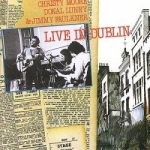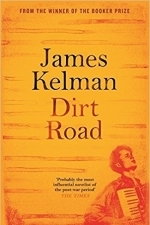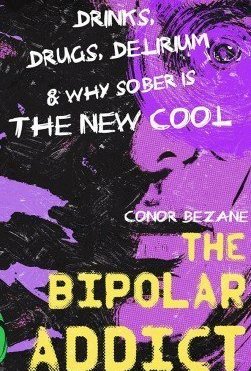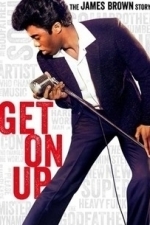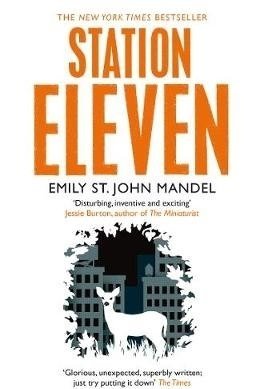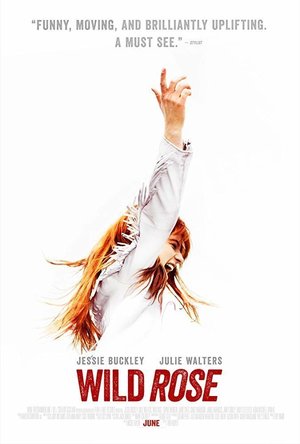Search
Search results
Noel Gallagher recommended La's by The La's in Music (curated)
Shirley Manson recommended Sulk by The Associates in Music (curated)
Kate Nash recommended track Black Is the Colour of My True Love's Hair by Christy Moore in Live in Dublin by Christy Moore in Music (curated)
Eilidh G Clark (177 KP) rated Dirt Road in Books
May 13, 2017
Kelman is an expert in understanding people
Kelman’s new novel Dirt Road is story that takes both characters and reader on a journey right from the outset, but the journey is more than it seems. The novel begins in the West coast of Scotland where we learn that Murdo - a sixteen-year-old boy - and his father Tom are mourning the death of their mother/wife and sister/daughter. Searching for solace, they embark on a journey to Alabama, U.S.A to spend time with Uncle John and Aunt Maureen. For Murdo, family is just a happy memory, a moment in time captured in a photograph, ‘The family was four and not just him and Dad’, whilst for Tom, family is the bond that holds them together. Throughout the journey, Tom strives to guide his son and keep him on ‘the right path’, yet Murdo, as we will learn, has a path of his own to find. Stifled by the fathers influence, the boy has a tendency to stray, thus when they reach Allentown Mississippi, Murdo stumbles upon a family of musicians led by Zydeco performer Queen Monzee-ay. Murdo is as drawn to music as his father is to family, the boy himself is an accomplished accordion player, and when he is offered an opportunity to play a set with Queen Monzee-ay in two weeks’ time, we watch as the road between father and son diverges and choice and risk becomes the key plot in the story.
While this may appear a simple story line, Kelman’s exploration into the fragmented relationship between father and son gives the reader an honest analysis of family and grief. The third person narrator, with bursts of free indirect discourse from Murdo, allows the reader both an internal and external insight into the constraints of family. This parallel leaves the reader feeling uncomfortable, yet with a conflicting heart. This is Kelman’s unique writing style at its best.
Dirt Road is more than a novel of grief and family relationships though; it is a novel of risk, of following new paths with uncertainties, about leaving behind the familiarities and safety of the past and following the heart. It is about deep connections; for Murdo this is through music and the feeling of freedom that he associates with music, whilst for the other characters it is about cultural connections and Scottish ancestry. Kelman’s clever use of parallels shows the reader the intensity of human connections whilst suggesting that change and progression is possible. This great novel will linger in your thoughts for weeks after you put it down, and it brings to mind a poem by Robert Frost, The Road Not Taken
I shall be telling this with a sigh
Somewhere ages and ages hence:
Two roads diverged in a wood, and I—
I took the one less traveled by,
And that has made all the difference.
For the full poem visit (https://www.poetryfoundation.org).
Dirt Road by James Kelman
Canongate Books (14 July 2016)
While this may appear a simple story line, Kelman’s exploration into the fragmented relationship between father and son gives the reader an honest analysis of family and grief. The third person narrator, with bursts of free indirect discourse from Murdo, allows the reader both an internal and external insight into the constraints of family. This parallel leaves the reader feeling uncomfortable, yet with a conflicting heart. This is Kelman’s unique writing style at its best.
Dirt Road is more than a novel of grief and family relationships though; it is a novel of risk, of following new paths with uncertainties, about leaving behind the familiarities and safety of the past and following the heart. It is about deep connections; for Murdo this is through music and the feeling of freedom that he associates with music, whilst for the other characters it is about cultural connections and Scottish ancestry. Kelman’s clever use of parallels shows the reader the intensity of human connections whilst suggesting that change and progression is possible. This great novel will linger in your thoughts for weeks after you put it down, and it brings to mind a poem by Robert Frost, The Road Not Taken
I shall be telling this with a sigh
Somewhere ages and ages hence:
Two roads diverged in a wood, and I—
I took the one less traveled by,
And that has made all the difference.
For the full poem visit (https://www.poetryfoundation.org).
Dirt Road by James Kelman
Canongate Books (14 July 2016)
Becs (244 KP) rated The Bipolar Addict in Books
Jun 4, 2019
Very informative!
Rating: ☆☆☆☆.5
Review:
I received a copy to read and review from Smith Publicity for my honest opinion.
TRIGGER WARNINGS: Drug abuse, alcohol abuse, suicide attempts, bullying, sexual abuse.
The Bipolar Addict is broken up into three parts: Part 1 - Conor's Story, Part 2 - Interviews of others who battle with Manic Depression and Bipolar disorder, and Part 3 - Talking of Recovery, getting help, and that sober is the new cool.
Part 1 follows the hardships Conor endured growing up. Bullying which eventually lead to alcohol abuse and then later drug abuse as he grew older. During this time, he also attempted suicide a few times. Conor was then diagnosed with Bipolar disorder, manic depression, and anxiety. Mix all that with alcohol and drug abuse and his body was struggling.
As I read, I was enthralled in the world of what Bipolar disorder really is. I was also blown away with the writing style. The Bipolar Addict is a debut novel by Conor Bezane and he definitely has a way of grabbing your attention and holding it instantly. A first time author, Conor has taken his life and spun it into a tale of struggles, sacrifice, and recovery that will tear the readers heart out, rip it into pieces, and then piece it back together, little by little.
Part 2 was just as interesting as part 1. You learn about a few others who used and through some rough patches like Conor. Part 3 was more informative compared to parts 1 and 2, talking about sober being the new cool and that it's healthy. The book ends with links and information on different helpful groups in the chance that you need to seek help for yourself.
"We are punks. We are poets. Musicians and artists. Professionals and intellectuals. We are drunk. High. Manic. Depressed. We almost died. And now we are stable and sober."
Reasons why I rated it 4.5 stars:
1. The plot:
There really wasn't much of a plot as this was a memoir/ self-help book. But the way Conor wrote, captivated my attention through and through.
2. My enjoyment:
I surprisingly was really interested in the entirety of this book. I couldn't put it down as Conor captivated me, not only in his writing but also the way he was able to take his life and spin it into a tale that read like he was a friend having a conversation.
3. Character and story development:
Again, this was a memoir/ self-help book, so there wasn't much development as it wasn't needed.
4. Grammar and spelling:
I did notice a few grammatical and spelling errors but for this being a debut, I really didn't mind.
5. The overall story:
The way that Conor wrote, you could feel the pain, loss, and loneliness. The lows of depression and the highs of mania. It was all otherworldly and from someone who has balanced depression and anxiety the majority of my life, I felt the painful and roller coaster of a life that Conor lived. This was definitely worth the read and was highly informative.
"Keep coming back."
Review:
I received a copy to read and review from Smith Publicity for my honest opinion.
TRIGGER WARNINGS: Drug abuse, alcohol abuse, suicide attempts, bullying, sexual abuse.
The Bipolar Addict is broken up into three parts: Part 1 - Conor's Story, Part 2 - Interviews of others who battle with Manic Depression and Bipolar disorder, and Part 3 - Talking of Recovery, getting help, and that sober is the new cool.
Part 1 follows the hardships Conor endured growing up. Bullying which eventually lead to alcohol abuse and then later drug abuse as he grew older. During this time, he also attempted suicide a few times. Conor was then diagnosed with Bipolar disorder, manic depression, and anxiety. Mix all that with alcohol and drug abuse and his body was struggling.
As I read, I was enthralled in the world of what Bipolar disorder really is. I was also blown away with the writing style. The Bipolar Addict is a debut novel by Conor Bezane and he definitely has a way of grabbing your attention and holding it instantly. A first time author, Conor has taken his life and spun it into a tale of struggles, sacrifice, and recovery that will tear the readers heart out, rip it into pieces, and then piece it back together, little by little.
Part 2 was just as interesting as part 1. You learn about a few others who used and through some rough patches like Conor. Part 3 was more informative compared to parts 1 and 2, talking about sober being the new cool and that it's healthy. The book ends with links and information on different helpful groups in the chance that you need to seek help for yourself.
"We are punks. We are poets. Musicians and artists. Professionals and intellectuals. We are drunk. High. Manic. Depressed. We almost died. And now we are stable and sober."
Reasons why I rated it 4.5 stars:
1. The plot:
There really wasn't much of a plot as this was a memoir/ self-help book. But the way Conor wrote, captivated my attention through and through.
2. My enjoyment:
I surprisingly was really interested in the entirety of this book. I couldn't put it down as Conor captivated me, not only in his writing but also the way he was able to take his life and spin it into a tale that read like he was a friend having a conversation.
3. Character and story development:
Again, this was a memoir/ self-help book, so there wasn't much development as it wasn't needed.
4. Grammar and spelling:
I did notice a few grammatical and spelling errors but for this being a debut, I really didn't mind.
5. The overall story:
The way that Conor wrote, you could feel the pain, loss, and loneliness. The lows of depression and the highs of mania. It was all otherworldly and from someone who has balanced depression and anxiety the majority of my life, I felt the painful and roller coaster of a life that Conor lived. This was definitely worth the read and was highly informative.
"Keep coming back."
Darren (1599 KP) rated Get On Up (2014) in Movies
Oct 17, 2019
Thoughts on Get on Up
Characters – James Brown is one of the most influential musicians of the last century, there is no doubt what he did will live on forever. We get to see how James started with nothing, in an abusive childhood with no education, before learning to take the chances thrown his way, trying to make a difference to the world in the spotlight, even if he doesn’t always keep the crowd around him, not always as loyal as he should be. This doesn’t make James look like the most integral person behind the spotlight. Bobby Byrd is the man that gave James a chance to get out of prison, to start something with his singing in gospel, he will stand by James through all the troubles he faces, the bands he goes through, knowing James is the main talent and just being part of this would make him remembered. Ben Bart makes everything happen for James, he tries to help him navigate difficult moments in history, but will help him make the right choices which sees the friendship grow as the success does. Susie is the mother of James, she is forced to leave because of her partner and once he becomes famous wants to come back into his life, while James isn’t willing to let this happen.
Performances – Chadwick Boseman is fantastic in the leading role, he shows that his biopic man, he can bring James Brown to life on stage and in his personal life with ease. Nelsan Ellis is great in his role, showing us that he could provide excellent supporting performances in the film. Dan Aykroyd is strong too, with Viola Davis making a big impact in her scenes in the film.
Story – The story here follows the life of James Brown, from his poverty like childhood, to his international success in the music industry, we see his ideas on wanting to make a change and just what it will do to the people that helped him get to the top. One of the biggest weaknesses in the film here comes from the early time jumps, we are constantly jumping between moments, which doesn’t help the story telling process. This story also doesn’t paint James as a nice person away from the spotlight, even if he was always trying to achieve something more from his career. The story does try to ram too much into the film, which does make it hard to understand each moment of his life.
Biopic/Music – This does show a lot of his life, it doesn’t help us get invested in just how much of an impact each moment was. The music can’t be questioned with his hits playing through the film with every beat we know.
Settings – The film creates some of the biggest stages of James career, never looking like we aren’t in the correct time period.
Scene of the Movie – The performances.
That Moment That Annoyed Me – The time jumps.
Final Thoughts – This is a by the book biopic, it has wonderful performances and the music you would expect to see, though we do cram too much in for everything to run smoothly.
Overall: By the Books Biopic.
Characters – James Brown is one of the most influential musicians of the last century, there is no doubt what he did will live on forever. We get to see how James started with nothing, in an abusive childhood with no education, before learning to take the chances thrown his way, trying to make a difference to the world in the spotlight, even if he doesn’t always keep the crowd around him, not always as loyal as he should be. This doesn’t make James look like the most integral person behind the spotlight. Bobby Byrd is the man that gave James a chance to get out of prison, to start something with his singing in gospel, he will stand by James through all the troubles he faces, the bands he goes through, knowing James is the main talent and just being part of this would make him remembered. Ben Bart makes everything happen for James, he tries to help him navigate difficult moments in history, but will help him make the right choices which sees the friendship grow as the success does. Susie is the mother of James, she is forced to leave because of her partner and once he becomes famous wants to come back into his life, while James isn’t willing to let this happen.
Performances – Chadwick Boseman is fantastic in the leading role, he shows that his biopic man, he can bring James Brown to life on stage and in his personal life with ease. Nelsan Ellis is great in his role, showing us that he could provide excellent supporting performances in the film. Dan Aykroyd is strong too, with Viola Davis making a big impact in her scenes in the film.
Story – The story here follows the life of James Brown, from his poverty like childhood, to his international success in the music industry, we see his ideas on wanting to make a change and just what it will do to the people that helped him get to the top. One of the biggest weaknesses in the film here comes from the early time jumps, we are constantly jumping between moments, which doesn’t help the story telling process. This story also doesn’t paint James as a nice person away from the spotlight, even if he was always trying to achieve something more from his career. The story does try to ram too much into the film, which does make it hard to understand each moment of his life.
Biopic/Music – This does show a lot of his life, it doesn’t help us get invested in just how much of an impact each moment was. The music can’t be questioned with his hits playing through the film with every beat we know.
Settings – The film creates some of the biggest stages of James career, never looking like we aren’t in the correct time period.
Scene of the Movie – The performances.
That Moment That Annoyed Me – The time jumps.
Final Thoughts – This is a by the book biopic, it has wonderful performances and the music you would expect to see, though we do cram too much in for everything to run smoothly.
Overall: By the Books Biopic.
Bob Mann (459 KP) rated David Brent: Life on the Road (2017) in Movies
Sep 29, 2021
A squirm-athon from beginning to end.
“Life on the Road” is a mockumentary sequel to the classic British version of the TV comedy “The Office” (obviously later remade for the US market and featuring Steve Carell). Ricky Gervais played the ego-centric David Brent, a monster of a character who exercised what little control he had in his managerial role at a Slough paper company.
Here in “Life on the Road” we join Brent 15 years later where he has taken a rung or two down the career ladder and is working as a sales rep for Lavachem, a sanitary goods manufacturer, also based in Slough.
But Brent still harbours a dream of making it big in the rock world with his middle-of-the-road band called ‘Foregone Conclusion (2)’. Gathering around him his ethnic rapper ‘friend’ Dom Johnson (Doc Brown) and a band of session musicians (who can’t stand him), Brent cashes in “several pensions” to fund a tour of the venues of Berkshire… or at least, those that will give stage time over to a “shite band”. As the tour delivers predictably diminishing returns, and no record-company interest (at least, not in him) Brent is forced to face his inner demons and some uncomfortable truths.
Bringing TV comedy characters to screen is fraught with difficulty, and few have successfully done it. Even legends like Morecambe and Wise struggled with a series of lacklustre films. Perhaps in recent times Steve Coogan’s Alan Partridge has come closest with “Alan Partridge – Alpha Papa” and indeed there are a lot of similarities visible between Partridge and Brent: both have extreme ego issues and self-centredness. But there are significant differences as well, for while Partridge is just an irritatingly loud and obnoxious minor-celebrity Brent – as this film makes much clearer – has real mental illness.
Brent - the sun shines out of his earhole.
Brent – the sun shines out of his earhole.
Is this therefore a comedy at all? Well, yes, but in a very black way. There are certainly moments of excellent humour, with the tattooing scene being a high-point. But the result of watching Brent’s progressive decline, with his nervous laugh as a constant ‘fingernails on chalk board’ reminder of his insecurity, results in a level of audience squirming that is palpable. Everything he does is perverse, from describing in excruciating detail every song before singing it, to spending his money on multiple hotel rooms when every gig is within the County of Berkshire.
As a black comedy its important that it doesn’t outstay its welcome, and at 96 minutes it doesn’t. However, the film lacks the courage of its own dark convictions, and unnecessarily switches tack in the last reel to provide a degree of redemption for Brent. Whilst ‘sweet’, it is also implausible given what’s happened before and I would have suspected the interference of the director in lightening the mood of the writer’s original intent. However, as Gervais is both writer and director, there is no such excuse. That’s a shame.
So, in summary, an uncomfortable watch that aligns appropriately with the high squirm factor of the original TV show. Prepare to laugh, but feel a bit guilty in doing so.
Here in “Life on the Road” we join Brent 15 years later where he has taken a rung or two down the career ladder and is working as a sales rep for Lavachem, a sanitary goods manufacturer, also based in Slough.
But Brent still harbours a dream of making it big in the rock world with his middle-of-the-road band called ‘Foregone Conclusion (2)’. Gathering around him his ethnic rapper ‘friend’ Dom Johnson (Doc Brown) and a band of session musicians (who can’t stand him), Brent cashes in “several pensions” to fund a tour of the venues of Berkshire… or at least, those that will give stage time over to a “shite band”. As the tour delivers predictably diminishing returns, and no record-company interest (at least, not in him) Brent is forced to face his inner demons and some uncomfortable truths.
Bringing TV comedy characters to screen is fraught with difficulty, and few have successfully done it. Even legends like Morecambe and Wise struggled with a series of lacklustre films. Perhaps in recent times Steve Coogan’s Alan Partridge has come closest with “Alan Partridge – Alpha Papa” and indeed there are a lot of similarities visible between Partridge and Brent: both have extreme ego issues and self-centredness. But there are significant differences as well, for while Partridge is just an irritatingly loud and obnoxious minor-celebrity Brent – as this film makes much clearer – has real mental illness.
Brent - the sun shines out of his earhole.
Brent – the sun shines out of his earhole.
Is this therefore a comedy at all? Well, yes, but in a very black way. There are certainly moments of excellent humour, with the tattooing scene being a high-point. But the result of watching Brent’s progressive decline, with his nervous laugh as a constant ‘fingernails on chalk board’ reminder of his insecurity, results in a level of audience squirming that is palpable. Everything he does is perverse, from describing in excruciating detail every song before singing it, to spending his money on multiple hotel rooms when every gig is within the County of Berkshire.
As a black comedy its important that it doesn’t outstay its welcome, and at 96 minutes it doesn’t. However, the film lacks the courage of its own dark convictions, and unnecessarily switches tack in the last reel to provide a degree of redemption for Brent. Whilst ‘sweet’, it is also implausible given what’s happened before and I would have suspected the interference of the director in lightening the mood of the writer’s original intent. However, as Gervais is both writer and director, there is no such excuse. That’s a shame.
So, in summary, an uncomfortable watch that aligns appropriately with the high squirm factor of the original TV show. Prepare to laugh, but feel a bit guilty in doing so.
Hazel (1853 KP) rated Station Eleven in Books
May 30, 2017
Horrifyingly Plausible
This ARC was provided by the publisher via NetGalley in exchange for an honest review
The dystopian idea of a virus wiping out most of the world’s human inhabitants is not a new concept. It has be done and retold over and over again. Emily St. John Mandel’s invention of the Georgian Flu is no different from these. Brought to Canada and the USA by a passenger on a plane from Russia, the highly contagious virus spreads quickly from person to person, town to town, and once caught you are dead within forty-eight hours.
The difference between Station Eleven and other novels of apocalyptic themes is that the story takes place primarily in two time periods – pre-Georgian Flu and twenty years post-Georgian flu – rather than during the outbreak and the immediate days after (although there are a few scenes written within that timeframe). It is difficult to explain the storyline without giving too much away. Although the death of millions of people is a vital feature, it is the lives of the characters that are important. All the significant characters are in some way linked to one man, Arthur Leander, and, particularly in the case of one individual, a graphic novel titled Station Eleven.
The book opens in Toronto with Arthur, a Hollywood actor, starring in a stage production of King Lear. Despite the quick reaction of trainee paramedic Jeevan, Arthur dies of a heart attack after suddenly collapsing during the forth act. Then suddenly, that same night, the Georgian flu makes its first appearance in Canada. Despite this occurring right at the beginning, it is not the last the reader sees of Arthur. Throughout the story the author returns to Arthur, recounting scenes of his life from acting career to his three ex-wives and only child.
Twenty years after the Georgian flu, Kirsten Raymonde, who starred as a child in the same production of King Lear, is part of the Traveling Symphony: a group of actors and musicians walking from decaying-town-to-town performing a number of Shakespeare plays as they go. With her she carries two Station Eleven comics that Arthur gave her before he died – incidentally written and drawn by his first wife. Most people that the Symphony encounter are accommodating and are trying their best to live in a world of no electricity or health care, but then they meet a man who calls himself the Prophet. Believing that he has been given a duty by God to repopulate the world he preaches to the people telling them that everything happens for a reason, likening the epidemic to Noah’s flood in the Bible. However it soon becomes clear that he is a dangerous character.
In a way it is heartening to imagine that high culture (such as Shakespeare and orchestral music) survives in a world that has been destroyed. Shakespeare was born in a time before all the modern inventions relied upon today, and now, in this novel, it is once again an electricity-less era yet these historical things live on.
One problem with Station Eleven is that it is hard to pinpoint the exact plot line. There is the life story of Arthur Leander, his wives and a close friend. Then there is Kirsten living a completely different life. Nonetheless it is still an incredibly fascinating book. Although it flits between time periods it is thankfully not as confusing as some may imagine it would be.
Even though dystopian novels of this nature have been done before, Station Eleven is definitely a book to read; and through it all it poses the question of how you, the reader, would survive in such a world.
The dystopian idea of a virus wiping out most of the world’s human inhabitants is not a new concept. It has be done and retold over and over again. Emily St. John Mandel’s invention of the Georgian Flu is no different from these. Brought to Canada and the USA by a passenger on a plane from Russia, the highly contagious virus spreads quickly from person to person, town to town, and once caught you are dead within forty-eight hours.
The difference between Station Eleven and other novels of apocalyptic themes is that the story takes place primarily in two time periods – pre-Georgian Flu and twenty years post-Georgian flu – rather than during the outbreak and the immediate days after (although there are a few scenes written within that timeframe). It is difficult to explain the storyline without giving too much away. Although the death of millions of people is a vital feature, it is the lives of the characters that are important. All the significant characters are in some way linked to one man, Arthur Leander, and, particularly in the case of one individual, a graphic novel titled Station Eleven.
The book opens in Toronto with Arthur, a Hollywood actor, starring in a stage production of King Lear. Despite the quick reaction of trainee paramedic Jeevan, Arthur dies of a heart attack after suddenly collapsing during the forth act. Then suddenly, that same night, the Georgian flu makes its first appearance in Canada. Despite this occurring right at the beginning, it is not the last the reader sees of Arthur. Throughout the story the author returns to Arthur, recounting scenes of his life from acting career to his three ex-wives and only child.
Twenty years after the Georgian flu, Kirsten Raymonde, who starred as a child in the same production of King Lear, is part of the Traveling Symphony: a group of actors and musicians walking from decaying-town-to-town performing a number of Shakespeare plays as they go. With her she carries two Station Eleven comics that Arthur gave her before he died – incidentally written and drawn by his first wife. Most people that the Symphony encounter are accommodating and are trying their best to live in a world of no electricity or health care, but then they meet a man who calls himself the Prophet. Believing that he has been given a duty by God to repopulate the world he preaches to the people telling them that everything happens for a reason, likening the epidemic to Noah’s flood in the Bible. However it soon becomes clear that he is a dangerous character.
In a way it is heartening to imagine that high culture (such as Shakespeare and orchestral music) survives in a world that has been destroyed. Shakespeare was born in a time before all the modern inventions relied upon today, and now, in this novel, it is once again an electricity-less era yet these historical things live on.
One problem with Station Eleven is that it is hard to pinpoint the exact plot line. There is the life story of Arthur Leander, his wives and a close friend. Then there is Kirsten living a completely different life. Nonetheless it is still an incredibly fascinating book. Although it flits between time periods it is thankfully not as confusing as some may imagine it would be.
Even though dystopian novels of this nature have been done before, Station Eleven is definitely a book to read; and through it all it poses the question of how you, the reader, would survive in such a world.
Hazel (1853 KP) rated Station Eleven in Books
Dec 7, 2018
<i>This ARC was provided by the publisher via NetGalley in exchange for an honest review</i>
The dystopian idea of a virus wiping out most of the world’s human inhabitants is not a new concept. It has be done and retold over and over again. Emily St. John Mandel’s invention of the Georgian Flu is no different from these. Brought to Canada and the USA by a passenger on a plane from Russia, the highly contagious virus spreads quickly from person to person, town to town, and once caught you are dead within forty-eight hours.
The difference between <i>Station Eleven</i> and other novels of apocalyptic themes is that the story takes place primarily in two time periods – pre-Georgian Flu and twenty years post-Georgian flu – rather than during the outbreak and the immediate days after (although there are a few scenes written within that timeframe). It is difficult to explain the storyline without giving too much away. Although the death of millions of people is a vital feature, it is the lives of the characters that are important. All the significant characters are in some way linked to one man, Arthur Leander, and, particularly in the case of one individual, a graphic novel titled <i>Station Eleven</i>.
The book opens in Toronto with Arthur, a Hollywood actor, starring in a stage production of <i>King Lear</i>. Despite the quick reaction of trainee paramedic Jeevan, Arthur dies of a heart attack after suddenly collapsing during the forth act. Then suddenly, that same night, the Georgian flu makes its first appearance in Canada. Despite this occurring right at the beginning, it is not the last the reader sees of Arthur. Throughout the story the author returns to Arthur, recounting scenes of his life from acting career to his three ex-wives and only child.
Twenty years after the Georgian flu, Kirsten Raymonde, who starred as a child in the same production of <i>King Lear</i>, is part of the Traveling Symphony: a group of actors and musicians walking from decaying-town-to-town performing a number of Shakespeare plays as they go. With her she carries two <i>Station Eleven</i> comics that Arthur gave her before he died – incidentally written and drawn by his first wife. Most people that the Symphony encounter are accommodating and are trying their best to live in a world of no electricity or health care, but then they meet a man who calls himself the Prophet. Believing that he has been given a duty by God to repopulate the world he preaches to the people telling them that everything happens for a reason, likening the epidemic to Noah’s flood in the Bible. However it soon becomes clear that he is a dangerous character.
In a way it is heartening to imagine that high culture (such as Shakespeare and orchestral music) survives in a world that has been destroyed. Shakespeare was born in a time before all the modern inventions relied upon today, and now, in this novel, it is once again an electricity-less era yet these historical things live on.
One problem with <i>Station Eleven</i> is that it is hard to pinpoint the exact plot line. There is the life story of Arthur Leander, his wives and a close friend. Then there is Kirsten living a completely different life. Nonetheless it is still an incredibly fascinating book. Although it flits between time periods it is thankfully not as confusing as some may imagine it would be.
Even though dystopian novels of this nature have been done before, <i>Station Eleven</i> is definitely a book to read; and through it all it poses the question of how you, the reader, would survive in such a world.
The dystopian idea of a virus wiping out most of the world’s human inhabitants is not a new concept. It has be done and retold over and over again. Emily St. John Mandel’s invention of the Georgian Flu is no different from these. Brought to Canada and the USA by a passenger on a plane from Russia, the highly contagious virus spreads quickly from person to person, town to town, and once caught you are dead within forty-eight hours.
The difference between <i>Station Eleven</i> and other novels of apocalyptic themes is that the story takes place primarily in two time periods – pre-Georgian Flu and twenty years post-Georgian flu – rather than during the outbreak and the immediate days after (although there are a few scenes written within that timeframe). It is difficult to explain the storyline without giving too much away. Although the death of millions of people is a vital feature, it is the lives of the characters that are important. All the significant characters are in some way linked to one man, Arthur Leander, and, particularly in the case of one individual, a graphic novel titled <i>Station Eleven</i>.
The book opens in Toronto with Arthur, a Hollywood actor, starring in a stage production of <i>King Lear</i>. Despite the quick reaction of trainee paramedic Jeevan, Arthur dies of a heart attack after suddenly collapsing during the forth act. Then suddenly, that same night, the Georgian flu makes its first appearance in Canada. Despite this occurring right at the beginning, it is not the last the reader sees of Arthur. Throughout the story the author returns to Arthur, recounting scenes of his life from acting career to his three ex-wives and only child.
Twenty years after the Georgian flu, Kirsten Raymonde, who starred as a child in the same production of <i>King Lear</i>, is part of the Traveling Symphony: a group of actors and musicians walking from decaying-town-to-town performing a number of Shakespeare plays as they go. With her she carries two <i>Station Eleven</i> comics that Arthur gave her before he died – incidentally written and drawn by his first wife. Most people that the Symphony encounter are accommodating and are trying their best to live in a world of no electricity or health care, but then they meet a man who calls himself the Prophet. Believing that he has been given a duty by God to repopulate the world he preaches to the people telling them that everything happens for a reason, likening the epidemic to Noah’s flood in the Bible. However it soon becomes clear that he is a dangerous character.
In a way it is heartening to imagine that high culture (such as Shakespeare and orchestral music) survives in a world that has been destroyed. Shakespeare was born in a time before all the modern inventions relied upon today, and now, in this novel, it is once again an electricity-less era yet these historical things live on.
One problem with <i>Station Eleven</i> is that it is hard to pinpoint the exact plot line. There is the life story of Arthur Leander, his wives and a close friend. Then there is Kirsten living a completely different life. Nonetheless it is still an incredibly fascinating book. Although it flits between time periods it is thankfully not as confusing as some may imagine it would be.
Even though dystopian novels of this nature have been done before, <i>Station Eleven</i> is definitely a book to read; and through it all it poses the question of how you, the reader, would survive in such a world.
Bob Mann (459 KP) rated Wild Rose (2018) in Movies
Sep 28, 2021
Three Chords and the Truth.
BAFTA named Jessie Buckley as one of their “Rising Stars” for 2019, and here she proves why.
Buckley plays Glaswegian Rose-Lynn Harlan, a decidedly wild child electronically tagged and released from the clink but straight down to some very public cowgirl sex with her erstwhile boyfriend. Only then does she have the afterthought of going round to the house of her Mum (Julie Walters) where two young children live. For Rose-Lynn is a single mum of two (#needs-to-be-more-careful-with-the-cowgirl-stuff), and the emotional damage metered out to the youngsters from her wayward life is fully evident.
Rose-Lynn is a frustrated ‘country-and-weste’… no, sorry… just ‘western’ singer, and she has a talent for bringing the house down in Glasgow during a show. The desire to ‘make it big’ in Nashville is bordering on obsession, and nothing – not her mum, not her children, nothing – will get in her way.
Rose-Lynn has no idea how to make her dream come true. (And no, she doesn’t bump into Bradley Cooper at this point). But things look up when she lies her way to a cleaning job for the middle class Susannah (Sophie Okonedo) who sees the talent in her and comes up with a couple of innovative ways to move her in the right direction.
Will she get out of her Glasgow poverty trap and rise to fame and fortune as a Nashville star?
Difficult to like.
Rose-Lynn is not an easy character to like. She is borderline sociopathic and has a self-centred selfish streak a mile wide. As she tramples all over her offspring’s young lives, breaking each and every promise like clockwork, then you just want to shout at her and give her a good shaking. It’s a difficult line for the film to walk (did the ghost of Johnny Cash make me write that?) and it only barely walks it unscathed.
Memories of Birdman.
A key shout-out needs to go to director Tom Harper (“Woman in Black 2“, and the TV epic “War and Peace”) and his cinematographer of choice George Steel. Some of the angles and framed shots are exquisitely done. A fantastic dance sequence through Susannah’s house (the best since Hugh Grant‘s No. 10 “Jump” in “Love Actually”) reveals the associated imaginary musicians in various alcoves reminiscent of the drummer in “Birdman“. And there are a couple of great drone shots: one (no spoilers) showing Rose-Lynn leaving a party is particularly effective.
The turns.
The camera simply loves Jessie Buckley. She delivers real energy in the good times and real pathos in the bad. She can – assuming it’s her performing – also sing! (No surprise since she was, you might remember, runner up to Jodie Prenger in the BBC search for a “Maria” for Lloyd Webber’s “Sound of Music”). She is certainly one to watch on the acting stage.
Supporting Buckley in prime roles are national treasure Julie Walters, effecting an impressive Glaswegian accent, and Sophie Okonedo, who is one of those well-known faces from TV that you can never quite place. BBC Radio 2’s Bob Harris also turns up as himself, being marvellously unconvincing as an actor!
But I don’t like country music?
Frankly neither do I. But it hardly matters. As long as you don’t ABSOLUTELY LOATHE it, I predict you’ll tolerate the tunes and enjoy the movie. Followers of this blog might remember that – against the general trend – I was highly unimpressed with “A Star is Born“. This movie I enjoyed far, far more.
Buckley plays Glaswegian Rose-Lynn Harlan, a decidedly wild child electronically tagged and released from the clink but straight down to some very public cowgirl sex with her erstwhile boyfriend. Only then does she have the afterthought of going round to the house of her Mum (Julie Walters) where two young children live. For Rose-Lynn is a single mum of two (#needs-to-be-more-careful-with-the-cowgirl-stuff), and the emotional damage metered out to the youngsters from her wayward life is fully evident.
Rose-Lynn is a frustrated ‘country-and-weste’… no, sorry… just ‘western’ singer, and she has a talent for bringing the house down in Glasgow during a show. The desire to ‘make it big’ in Nashville is bordering on obsession, and nothing – not her mum, not her children, nothing – will get in her way.
Rose-Lynn has no idea how to make her dream come true. (And no, she doesn’t bump into Bradley Cooper at this point). But things look up when she lies her way to a cleaning job for the middle class Susannah (Sophie Okonedo) who sees the talent in her and comes up with a couple of innovative ways to move her in the right direction.
Will she get out of her Glasgow poverty trap and rise to fame and fortune as a Nashville star?
Difficult to like.
Rose-Lynn is not an easy character to like. She is borderline sociopathic and has a self-centred selfish streak a mile wide. As she tramples all over her offspring’s young lives, breaking each and every promise like clockwork, then you just want to shout at her and give her a good shaking. It’s a difficult line for the film to walk (did the ghost of Johnny Cash make me write that?) and it only barely walks it unscathed.
Memories of Birdman.
A key shout-out needs to go to director Tom Harper (“Woman in Black 2“, and the TV epic “War and Peace”) and his cinematographer of choice George Steel. Some of the angles and framed shots are exquisitely done. A fantastic dance sequence through Susannah’s house (the best since Hugh Grant‘s No. 10 “Jump” in “Love Actually”) reveals the associated imaginary musicians in various alcoves reminiscent of the drummer in “Birdman“. And there are a couple of great drone shots: one (no spoilers) showing Rose-Lynn leaving a party is particularly effective.
The turns.
The camera simply loves Jessie Buckley. She delivers real energy in the good times and real pathos in the bad. She can – assuming it’s her performing – also sing! (No surprise since she was, you might remember, runner up to Jodie Prenger in the BBC search for a “Maria” for Lloyd Webber’s “Sound of Music”). She is certainly one to watch on the acting stage.
Supporting Buckley in prime roles are national treasure Julie Walters, effecting an impressive Glaswegian accent, and Sophie Okonedo, who is one of those well-known faces from TV that you can never quite place. BBC Radio 2’s Bob Harris also turns up as himself, being marvellously unconvincing as an actor!
But I don’t like country music?
Frankly neither do I. But it hardly matters. As long as you don’t ABSOLUTELY LOATHE it, I predict you’ll tolerate the tunes and enjoy the movie. Followers of this blog might remember that – against the general trend – I was highly unimpressed with “A Star is Born“. This movie I enjoyed far, far more.


